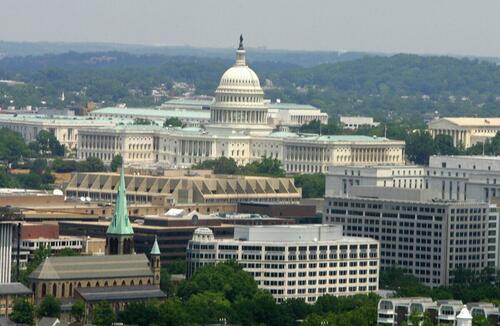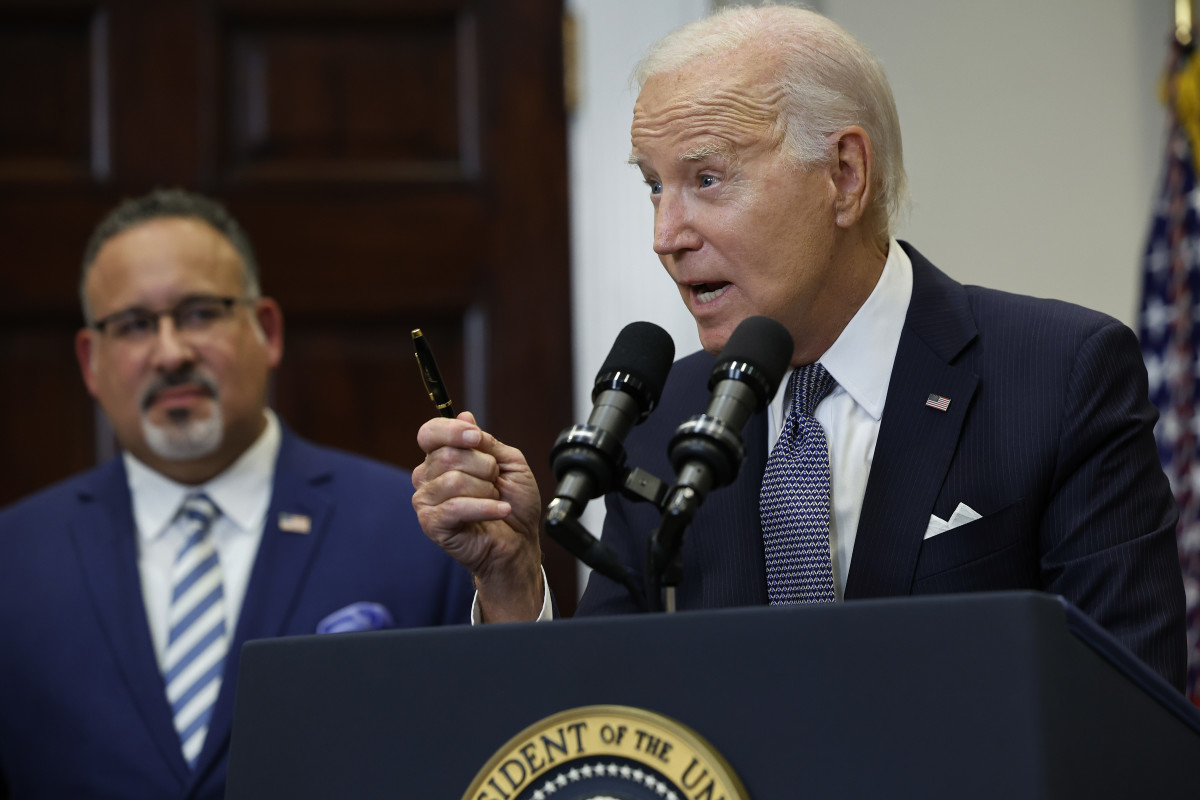Government
Election Group With Ties To Soros, Zuckerberg Meets In Washington For Conference Closed To Public
Election Group With Ties To Soros, Zuckerberg Meets In Washington For Conference Closed To Public
Authored by Joseph Lord via The Epoch Times…

Authored by Joseph Lord via The Epoch Times (emphasis ours),
An elections group with ties to Democrat mega-donor George Soros and Meta CEO Mark Zuckerberg gathered in Washington this week for a meeting that was closed to the public.
The Epoch Times was denied entry to the event, called a “Summit on American Democracy” and hosted by the Center for Election Integrity & Research (CEIR). Organizers said that the event was invite-only. Only preapproved press and other guests were permitted to attend the summit.
Though the event was live-streamed, the closed nature of the event deprived independent media of access to the laundry list of high-ranking officials attending the summit, including a litany of Secretaries of State, who oversee elections, and other election officials. Among those attending the conference were Georgia Secretary of State Brad Raffensperger and Bill Gates, county supervisor for Maricopa County, Arizona.
The group describes itself as “committed to a fiercely nonpartisan approach.” But partisan allegations against its founder, funding by Zuckerberg, and indirect ties to the left-wing Soros challenge that description.
During the livestream of the event, the group’s founder, David Becker, set the tone for the conference in his opening remarks, repeating contested claims about the security of the 2020 election, and dismissing concerns about election fraud as unfounded.
“The 2020 election was, simply put, the most secure, transparent, and verifiable election in American history and it’s not close,” Becker claimed.
At least one journalist who challenged this narrative was allegedly removed from the conference.
Laura Loomer, an outspoken ally of President Donald Trump and proponent of theories about widespread election fraud in 2020, reported that she was thrown out of the conference for confronting election officials from Arizona and Georgia. The organizers later called the police on Loomer.
Becker founded CEIR in 2016. He has also been instrumental in several other electoral organizations and efforts across his career.
Partisan Accusations
During the summit, Becker sought to present himself as nonpartisan and unbiased.
He claimed that he was one of the few election officials who was willing to acclaim Trump’s 2016 victory as legitimate, even as others considered claims that voter fraud and election tampering had deprived Hillary Clinton of a victory.
However, Becker founded CEIR in response to concerns about “foreign interference” in elections, an oft-repeated claim that Trump won in 2016 due to widespread Russian interference. But later multimillion-dollar federal investigations into Trump’s victory turned up no evidence of these claims.
And the founder’s track record is splotched with claims of political biases against conservatives.
In 2005, Becker—who has worked in elections for decades—was the subject of a formal ethics complaint while working in the Civil Rights division of the Department of Justice (DOJ).
During the Republican administration of President George W. Bush, Becker offered his expertise in election law to the city of Boston to defeat a lawsuit from the DOJ regarding election law violations.
In the investigation into this matter, it was discovered that Becker had made a series of “nasty, disparaging remarks about Republicans,” Hans von Spakovsky said. Von Spakovsky, who now is employed by the Heritage Foundation, was a DOJ legal counsel at the time.
“In his role with the DOJ, [Becker] was supposed to be nonpartisan,” von Spakovsky said.
“Very unethical and unprofessional,” he added. “I would never hire or trust him.”
Brad Schlozman, who directed the Civil Rights division at the time, was even more critical, suggesting that Becker deserved to be disbarred.
“It was the most unethical thing I’ve ever seen,” Schlozman said. “Classic case of someone who should have been disbarred.”
He added that Becker was “a hard-core leftist” and someone who “couldn’t stand conservatives.”
As recently as last year, Becker portrayed Trump as a liar and a danger to democratic norms in comments to The Washington Post.
“We have a significant percentage of the American electorate right now who have been lied to about the integrity of our elections, who believe that elections … are rigged unless their candidate wins,” Becker said. “Yet it’s nowhere close to 50 percent of America overall. But if Trump were to win a narrow victory again, I could see [election denial] ideas … infecting a larger percentage of the electorate. And if a large segment of a democracy’s electorate loses confidence in elections, that democracy probably is unsustainable.”
CEIR did not respond to an Epoch Times request for comment about these allegations.
However, in past comments to another media outlet, Becker addressed some of the allegations, but left others unanswered: “This complaint was made over 15 years ago, if memory serves, and was dismissed. There was no action taken against me by the Department of Justice as a result of this complaint. As you know, anyone can make a complaint for any reason, with or without basis.
“I served faithfully at the DOJ for seven years, from 1998 to 2005, during which time I received a Special Commendation of Merit from the Attorney General in 2002, during the Bush administration,” he added.
Almost $70 Million from Zuckerberg
In August 2020, Becker’s organization received a staggering $69.5 million from Meta CEO Mark Zuckerberg.
Under the appearance of COVID-19 safety precautions, this funding was used to furnish key swing states with more mail-in drop boxes.
Zuckerberg’s donation to CEIR came as part of a series of purportedly nonpartisan donations by the Facebook creator.
Read more here...
Government
Young People Aren’t Nearly Angry Enough About Government Debt
Young People Aren’t Nearly Angry Enough About Government Debt
Authored by The American Institute for Economic Research,
Young people sometimes…

Authored by The American Institute for Economic Research,
Young people sometimes seem to wake up in the morning in search of something to be outraged about. We are among the wealthiest and most educated humans in history. But we’re increasingly convinced that we’re worse off than our parents were, that the planet is in crisis, and that it’s probably not worth having kids.
I’ll generalize here about my own cohort (people born after 1981 but before 2010), commonly referred to as Millennials and Gen Z, as that shorthand corresponds to survey and demographic data. Millennials and Gen Z have valid economic complaints, and the conditions of our young adulthood perceptibly weakened traditional bridges to economic independence. We graduated with record amounts of student debt after President Obama nationalized that lending. Housing prices doubled during our household formation years due to zoning impediments and chronic underbuilding. Young Americans say economic issues are important to us, and candidates are courting our votes by promising student debt relief and cheaper housing (which they will never be able to deliver).
Young people, in our idealism and our rational ignorance of the actual appropriations process, typically support more government intervention, more spending programs, and more of every other burden that has landed us in such untenable economic circumstances to begin with. Perhaps not coincidentally, young people who’ve spent the most years in the increasingly partisan bubble of higher education are also the most likely to favor expanded government programs as a “solution” to those complaints.
It’s Your Debt, Boomer
What most young people don’t yet understand is that we are sacrificing our young adulthood and our financial security to pay for debts run up by Baby Boomers. Part of every Millennial and Gen-Z paycheck is payable to people the same age as the members of Congress currently milking this system and miring us further in debt.
Our government spends more than it can extract from taxpayers. Social Security, which represents 20 percent of government spending, has run an annual deficit for 15 years. Last year Social Security alone overspent by $22.1 billion. To keep sending out checks to retirees, Social Security goes begging to the Treasury Department, and the Treasury borrows from the public by issuing bonds. Bonds allow investors (who are often also taxpayers) to pay for some retirees’ benefits now, and be paid back later. But investors only volunteer to lend Social Security the money it needs to cover its bills because the (younger) taxpayers will eventually repay the debt — with interest.
In other words, both Social Security and Medicare, along with various smaller federal entitlement programs, together comprising almost half of the federal budget, have been operating for a decade on the principle of “give us the money now, and stick the next generation with the check.” We saddle future generations with debt for present-day consumption.
The second largest item in the budget after Social Security is interest on the national debt — largely on Social Security and other entitlements that have already been spent. These mandatory benefits now consume three quarters of the federal budget: even Congress is not answerable for these programs. We never had the chance for our votes to impact that spending (not that older generations were much better represented) and it’s unclear if we ever will.
Young Americans probably don’t think much about the budget deficit (each year’s overspending) or the national debt (many years’ deficits put together, plus interest) much at all. And why should we? For our entire political memory, the federal government, as well as most of our state governments, have been steadily piling “public” debt upon our individual and collective heads. That’s just how it is. We are the frogs trying to make our way in the watery world as the temperature ticks imperceptibly higher. We have been swimming in debt forever, unaware that we’re being economically boiled alive.
Millennials have somewhat modest non-mortgage debt of around $27,000 (some self-reports say twice that much), including car notes, student loans, and credit cards. But we each owe more than $100,000 as a share of the national debt. And we don’t even know it.
When Millennials finally do have babies (and we are!) that infant born in 2024 will enter the world with a newly minted Social Security Number and $78,089 credit card bill for Granddad’s heart surgery and the interest on a benefit check that was mailed when her parents were in middle school.
Headlines and comments sections love to sneer at “snowflakes” who’ve just hit the “real world,” and can’t figure out how to make ends meet, but the kids are onto something. A full 15 percent of our earnings are confiscated to pay into retirement and healthcare programs that will be insolvent by the time we’re old enough to enjoy them. The Federal Reserve and government debt are eating the economy. The same interest rates that are pushing mortgages out of reach are driving up the cost of interest to maintain the debt going forward. As we learn to save and invest, our dollars are slowly devalued. We’re right to feel trapped.
Sure, if we’re alive and own a smartphone, we’re among the one percent of the wealthiest humans who’ve ever lived. Older generations could argue (persuasively!) that we have no idea what “poverty” is anymore. But with the state of government spending and debt…we are likely to find out.
Despite being richer than Rockefeller, Millennials are right to say that the previous ways of building income security have been pushed out of reach. Our earning years are subsidizing not our own economic coming-of-age, but bank bailouts, wars abroad, and retirement and medical benefits for people who navigated a less-challenging wealth-building landscape.
Redistribution goes both ways. Boomers are expected to pass on tens of trillions in unprecedented wealth to their children (if it isn’t eaten up by medical costs, despite heavy federal subsidies) and older generations’ financial support of the younger has had palpable lifting effects. Half of college costs are paid by families, and the trope of young people moving back home is only possible if mom and dad have the spare room and groceries to make that feasible.
Government “help” during COVID-19 resulted in the worst inflation in 40 years, as the federal government spent $42,000 per citizen on “stimulus” efforts, right around a Millennial’s average salary at that time. An absurd amount of fraud was perpetrated in the stimulus to save an economy from the lockdown that nearly ruined it. Trillions in earmarked goodies were rubber stamped, carelessly added to young people’s growing bill. Government lenders deliberately removed fraud controls, fearing they couldn’t hand out $800 billion in young people’s future wages away fast enough. Important lessons were taught by those programs. The importance of self-sufficiency and the dignity of hard work weren’t top of the list.
Boomer Benefits are Stagnating Hiring, Wages, and Investment for Young People
Even if our workplace engagement suffered under government distortions, Millennials continue to work more hours than other generations and invest in side hustles and self employment at higher rates. Working hard and winning higher wages almost doesn’t matter, though, when our purchasing power is eaten from the other side. Buying power has dropped 20 percent in just five years. Life is $11,400/year more expensive than it was two years ago and deficit spending is the reason why.
We’re having trouble getting hired for what we’re worth, because it costs employers 30 percent more than just our wages to employ us. The federal tax code both requires and incentivizes our employers to transfer a bunch of what we earned directly to insurance companies and those same Boomer-busted federal benefits, via tax-deductible benefits and payroll taxes. And the regulatory compliance costs of ravenous bureaucratic state. The price paid by each employer to keep each employee continues to rise — but Congress says your boss has to give most of the increase to someone other than you.
Federal spending programs that many people consider good government, including Social Security, Medicare, Medicaid, and health insurance for children (CHIP) aren’t a small amount of the federal budget. Government spends on these programs because people support and demand them, and because cutting those benefits would be a re-election death sentence. That’s why they call cutting Social Security the “third rail of politics.” If you touch those benefits, you die. Congress is held hostage by Baby Boomers who are running up the bill with no sign of slowing down.
Young people generally support Social Security and the public health insurance programs, even though a 2021 poll by Nationwide Financial found 47 percent of Millennials agree with the statement “I will not get a dime of the Social Security benefits I have earned.”
In the same survey, Millennials were the most likely of any generation to believe that Social Security benefits should be enough to live on as a sole income, and guessed the retirement age was 52 (it’s 67 for anyone born after 1959 — and that’s likely to rise). Young people are the most likely to see government guarantees as a valid way to live — even though we seem to understand that those promises aren’t guarantees at all.
Healthcare costs tied to an aging population and wonderful-but-expensive growth in medical technologies and medications will balloon over the next few years, and so will the deficits in Boomer benefit programs. Newly developed obesity drugs alone are expected to add $13.6 billion to Medicare spending. By 2030, every single Baby Boomer will be 65, eligible for publicly funded healthcare.
The first Millennial will be eligible to claim Medicare (assuming the program exists and the qualifying age is still 65, both of which are improbable) in 2046. As it happens, that’s also the year that the Boomer benefits programs (which will then be bloated with Gen Xers) and the interest payments we’re incurring to provide those benefits now, are projected to consume 100 percent of federal tax revenue.
Government spending is being transferred to bureaucrats and then to the beneficiaries of government spending who are, in some sense, your diabetic grandma who needs a Medicare-paid dialysis treatment, but in a much more immediate sense, are the insurance companies, pharma giants, and hospital corporations who wrote the healthcare legislation. Some percentage of every college graduate’s paycheck buys bullets that get fired at nothing and inflating the private investment portfolios of government contractors, with dubious, wasteful outcomes from the prison-industrial complex to the perpetual war machine.
No bank or nation in the world can lend the kind of money the American government needs to borrow to fulfill its obligations to citizens. Someone will have to bite the bullet. Even some of the co-authors of the current disaster are wrestling with the truth.
Forget avocado toast and streaming subscriptions. We’re already sensing it, but we haven’t yet seen it. Young people are not well-informed, and often actively misled, about what’s rotten in this economic system. But we are seeing the consequences on store shelves and mortgage contracts and we can sense disaster is coming. We’re about to get stuck with the bill.
Government
Student loan borrowers may finally get answers to loan forgiveness issues
A major student loan service company has been invited to face Congress over its alleged servicing failures.

U.S. Sen. Elizabeth Warren (D-MA) wants answers from one of the top student loan service companies in the country for allegedly botching its student loan forgiveness process involving the federal Public Service Loan Forgiveness program, leaving borrowers confused and without answers.
The senator sent a letter to Mohela CEO Scott Giles on March 18 inviting him to testify before Congress at a hearing on April 10 titled “MOHELA’s Performance as a Student Loan Servicer.” During the hearing, Giles will have to answer for why his company allegedly failed to send billing statements to student loan borrowers in a timely manner and miscalculated monthly payments for borrowers when it was time for them to repay their loans in September last year.
Related: Here's who qualifies for Biden's student loan debt relief starting next month
Also, in the letter, Warren highlighted a report that claimed that Mohela failed to perform basic servicing functions for borrowers eligible for PSLF, which led to over 800,000 public service workers facing delays in receiving student debt relief. The report also accuses the company of using a “‘call deflection’ scheme” to keep customers away from speaking to a customer service representative and instead redirecting them to parts of their website.
“Your company has contributed to student loan borrowers’ difficulties by mishandling borrowers’ return to repayment following the COVID-19 pandemic-related pause on payments, interest, and collections and by impeding public servants’ access to PSLF relief,” wrote Warren in the letter.
The move from Warren comes after the U.S. Department of Education withheld $7.2 million in payments to its servicer Mohela in October as punishment because it failed to issue timely billing statements to 2.5 million borrowers which resulted in 800,000 borrowers becoming delinquent on their loans. The department ordered Mohela to put those affected by the issues into forbearance until the mess was resolved.
Mohela is also currently facing two class-action lawsuits, one filed in December last year and another in January this year, for its alleged “failure to timely process and render decisions for student loan borrowers enrolled in the Public Service Loan Forgiveness program.”
In response to recent criticism surrounding its alleged issues and failures regarding the PSLF program, Mohela claimed in a statement to the Missouri Independent that it “does not have authority to process loan forgiveness until authorization is provided by FSA, which can take months to occur.”
The company also claimed that there are “false accusations” inside of the bombshell report, which was released in February, that details the company’s servicing failures.
“It is unfortunate and irresponsible that information is being spun to create a false narrative in an attempt to mislead the public. False accusations are being disingenuously branded as an investigative report,” said Mohela.
white house congress pandemic covid-19International
Bolsonaro Indicted By Brazilian Police For Falsifying Covid-19 Vaccine Records
Bolsonaro Indicted By Brazilian Police For Falsifying Covid-19 Vaccine Records
Federal police in Brazil have indicted former President Jair…

Federal police in Brazil have indicted former President Jair Bolsonaro for falsifying his Covid-19 vaccine card in order to travel to the United States and elsewhere during the pandemic.
Federal prosecutors will review the indictment and decide whether to pursue the case - which would be the first time the former president has faced criminal charges.
According to the indictment, Bolsonaro ordered a top deputy to obtain falsified Covid-19 vaccine records of himself and his 13-year-old daughter in late 2022, right before he flew to Florida for a three-month stay following his election loss.
Brazilian police are also waiting to hear back from the US DOJ on whether Bolsonaro used said cards to enter the United States, which would open him up to further criminal charges, the NY Times reports.
Bolsonaro has repeatedly claimed not to have received the Covid-19 vaccine, but denies any involvement in a plan to falsify his vaccination records. A previous investigation by Brazil's comptroller general concluded that Bolsonaro's vaccination records were false.
The records show that Bolsonaro, a COVID-19 skeptic who publicly opposed the vaccine, received a dose of the immunizer in a public healthcare center in Sao Paulo in July 2021. [ZH: hilarious, Reuters calling the vaccine an 'immunizer.']
The investigation concluded, however, that the former president had left the city the previous day and didn't leave Brasilia until three days later, according to a statement.
The nurse listed in the records as having applied the vaccine on Bolsonaro denied doing so and was no longer working at the center. The listed vaccine lot was also not available on that date, the comptroller general's office said. -Reuters
"It's a selective investigation. I'm calm, I don't owe anything," Bolsonaro told Reuters. "The world knows that I didn't take the vaccine."
During the pandemic, Bolsonaro panned the vaccine - and instead insisted on alternative treatments such as Ivermectin, which has antiviral properties against Covid-19. For this, he was investigated by Brazil's congress, which recommended that the former president be charged with "crimes against humanity," among other things, for his actions during the pandemic.
In May, Brazilian police raided Bolsonaro's home, confiscating his cell phone and arresting one of his closest aides and two of his security cards in connection to the vaccine record investigation.
Brazil's electoral court ruled that Bolsonaro can't run for public office until 2030 after he suggested that the country's voting system was rigged. For that, he has to sit out the 2026 election.
-

 Spread & Containment7 days ago
Spread & Containment7 days agoIFM’s Hat Trick and Reflections On Option-To-Buy M&A
-

 Uncategorized4 weeks ago
Uncategorized4 weeks agoAll Of The Elements Are In Place For An Economic Crisis Of Staggering Proportions
-

 International2 weeks ago
International2 weeks agoEyePoint poaches medical chief from Apellis; Sandoz CFO, longtime BioNTech exec to retire
-

 Uncategorized1 month ago
Uncategorized1 month agoCalifornia Counties Could Be Forced To Pay $300 Million To Cover COVID-Era Program
-

 Uncategorized4 weeks ago
Uncategorized4 weeks agoApparel Retailer Express Moving Toward Bankruptcy
-

 Uncategorized1 month ago
Uncategorized1 month agoIndustrial Production Decreased 0.1% in January
-

 International2 weeks ago
International2 weeks agoWalmart launches clever answer to Target’s new membership program
-

 Uncategorized1 month ago
Uncategorized1 month agoRFK Jr: The Wuhan Cover-Up & The Rise Of The Biowarfare-Industrial Complex























